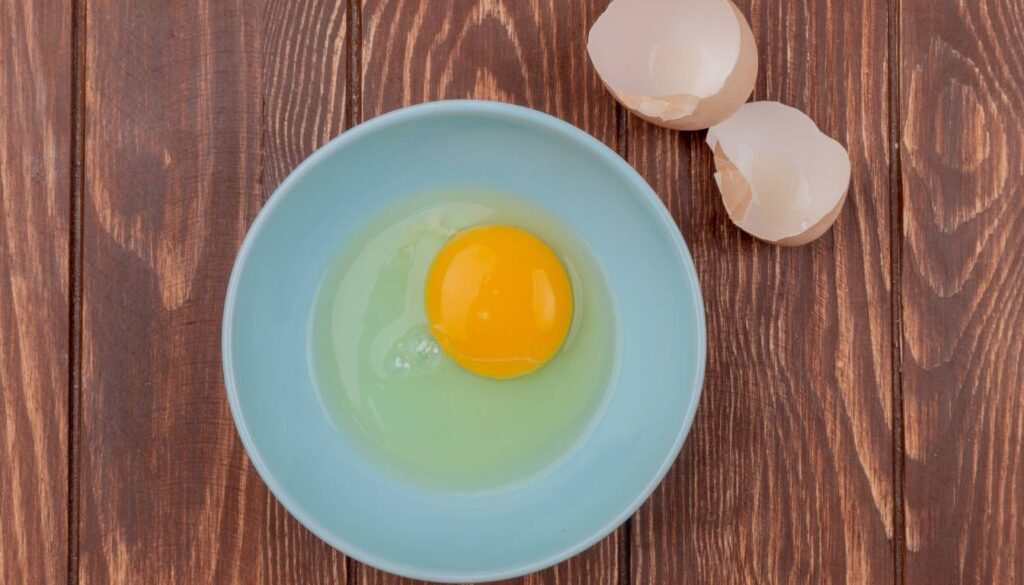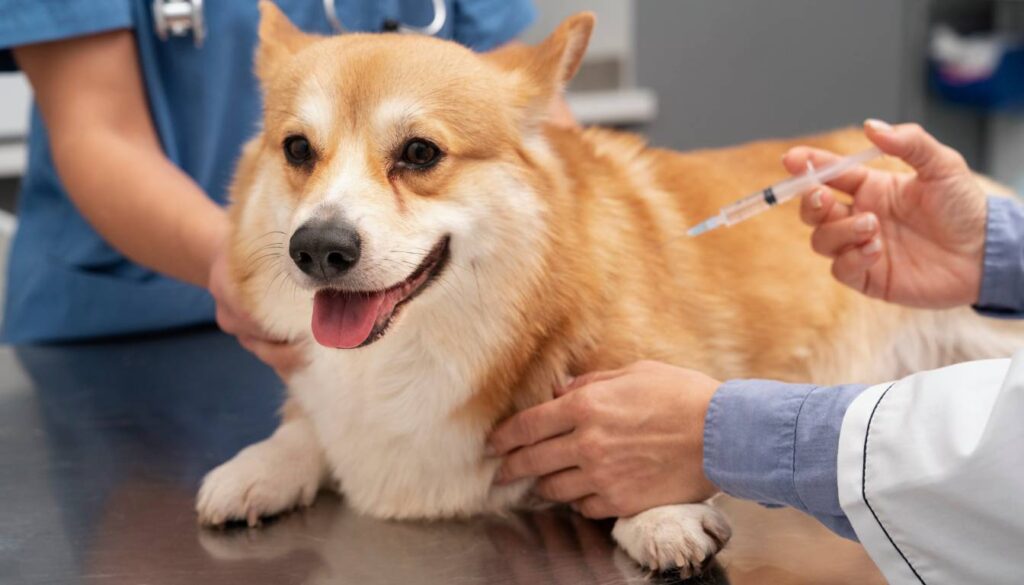Egg yolk is a well-known home remedy for parvo in dogs and cats. Parvo is a highly contagious virus that attacks the digestive system in dogs and can be fatal if not treated quickly. While there is no definitive cure, certain home remedies may help ease symptoms and support recovery. Egg yolk has been used for many years with promising results. Let’s take a closer look at using egg yolk as a home remedy for parvo.
Egg yolks from unvaccinated chickens are rich in immunoglobulins and colostrum, two components that can help eradicate the virus gradually. These components boost the immune system and help the body fight off the virus. Egg yolk is also easy to find and administer, making it a popular choice among pet owners. However, it is important to note that egg yolk should only be used as a complementary treatment, not as a substitute for veterinary care.
Understanding Parvo in Dogs
What is Parvo?
Parvo, short for canine parvovirus (CPV), is a highly contagious viral infection that affects dogs, particularly puppies. This virus attacks the immune system and the intestinal tract, leading to severe diarrhea, vomiting, and dehydration, which can be fatal if left untreated. Parvo can also affect the heart muscle in rare cases, causing myocarditis, which can lead to sudden death.
Causes and Symptoms
Parvo is caused by a highly resistant virus that can survive in the environment for months. The virus is shed in the feces of infected dogs and can be easily transmitted through direct contact with infected dogs or their feces. The virus can also be transferred indirectly through contaminated objects, such as food and water bowls, toys, and clothing.
The symptoms of parvo in dogs include lethargy, loss of appetite, depression, fever, and high temperatures. The most common symptom is severe diarrhea, which is often bloody and foul-smelling. Vomiting and nausea can also occur, leading to dehydration and electrolyte imbalances. Parvo can also weaken the immune system, making dogs more susceptible to secondary bacterial infections.
How is it Diagnosed?
Parvo is diagnosed through a combination of clinical signs, history, and laboratory tests. A veterinarian will perform a physical exam and take a thorough history of the dog’s symptoms and exposure to other dogs. Blood tests, such as the enzyme-linked immunosorbent assay (ELISA), can detect the presence of parvovirus antibodies in the blood. Fecal tests can also be performed to detect the presence of the virus in the feces.
It is important to note that not all dogs infected with parvo will test positive for the virus, especially in the early stages of infection. Therefore, a negative test result does not always rule out the possibility of parvo. In some cases, a presumptive diagnosis may be made based on clinical signs and history, and treatment may be initiated immediately to prevent further complications.
Overall, parvo is a serious condition that requires prompt veterinary attention. Early detection and treatment with supportive care, such as fluid therapy, medication, and nutritional support, can significantly improve the chances of survival. Dog owners should take preventive measures, such as vaccination and proper hygiene, to reduce the risk of infection and transmission of the virus.
Home Remedies for Treating Parvo
Dealing with parvo in dogs can be a stressful experience, but there are a number of home remedies that can help alleviate symptoms and support your dog’s recovery. Here are some effective home remedies for treating parvo:
Optimizing the Environment
First and foremost, it is important to optimize the environment in which your dog is recovering. This means keeping the area clean and free of any potential sources of infection. Make sure to disinfect any surfaces your dog comes into contact with, and keep them away from other dogs until they have fully recovered.
Proper Hydration
One of the most important things you can do to support your dog’s recovery from parvo is to ensure they are properly hydrated. Dehydration is a common complication of parvo and can lead to severe weight loss and other health problems. You can encourage your dog to drink water by adding unflavored Pedialyte or Gatorade to their water bowl, or by using a syringe to force-feed them water.
Garlic as a Natural Antiviral and Immune Booster
Garlic is a natural antiviral and immune booster that can help support your dog’s recovery from parvo. You can add garlic to your dog’s food or give them garlic supplements to help boost their immune system and fight off the virus.
Nutritional Support Through Diet
Proper nutrition is essential for supporting your dog’s recovery from parvo. You can help support their digestive tract by feeding them boiled rice, chicken broth, and other bland foods that are easy to digest. You can also add supplements like white willow bark or pancake syrup to their food to help regulate their glucose levels and support their immune system.
Specific Supplements – Home Remedies Egg Yolk For Parvo
There are a number of supplements that can help support your dog’s recovery from parvo. Activated charcoal can help absorb toxins in the digestive tract, while chamomile tea can help soothe inflammation and support the immune system. Tamiflu may also be prescribed by a veterinarian to help fight the virus.
Remember, home remedies can be a helpful supplement to professional medical care, but they should not be used as a substitute for hospitalization or other forms of supportive care. If your dog is severely dehydrated or experiencing other complications, it is important to seek veterinary care immediately.
Parvo Prevention – Home Remedies Egg Yolk For Parvo
As a dog owner, it is important to take preventative measures to reduce the risk of your dog contracting parvo. Here are some effective ways to prevent parvo:
Vaccinations – Home Remedies Egg Yolk For Parvo
One of the most effective ways to prevent parvo is through vaccinations. It is recommended to vaccinate puppies at 6-8 weeks of age, followed by boosters every 3-4 weeks until they are 16-20 weeks old. Adult dogs should receive a booster vaccine every 3 years.
Preventing the Spread of Infection – Home Remedies Egg Yolk For Parvo
Parvo is highly contagious and can spread easily. Here are some ways to prevent the spread of infection:
- Quarantine-infected dogs: If your dog is infected with parvo, it is important to quarantine them to prevent the spread of the virus to other dogs.
- Disinfect your home: Parvo can live on surfaces for up to 6 months, so it is important to disinfect your home thoroughly if your dog has been infected.
- Avoid contact with infected dogs: If you suspect that a dog has parvo, avoid contact with them and their feces.
- Practice good hygiene: Wash your hands thoroughly after handling dogs, especially if you have been in contact with an infected dog.
By following these preventative measures, you can reduce the risk of your dog contracting parvo. Remember, prevention is always better than cure.
Other Treatments for Parvo in Dogs – Home Remedies Egg Yolk For Parvo

When it comes to treating parvo in dogs, there are a few other options beyond using egg yolk as a home remedy. These treatments can be used in conjunction with supportive care and home remedies to help your dog recover from parvo.
Palliative Care – Home Remedies Egg Yolk For Parvo
If your dog is severely ill with parvo, palliative care may be necessary to keep them comfortable. This can include administering pain medication and anti-nausea medication to help with vomiting and diarrhea. It’s important to note that palliative care is not a cure for parvo, but it can help your dog feel more comfortable while they recover.
Use of Parvaid – Home Remedies Egg Yolk For Parvo
Parvaid is a homeopathic remedy that is often used to treat parvo in dogs. It is believed to work by boosting the immune system and helping the body fight off the virus. However, it’s important to note that there is limited scientific evidence to support the use of homeopathy in treating parvo.
In addition to these treatments, it’s important to continue supportive care for your dog. This can include providing them with plenty of fluids, such as Pedialyte or Gatorade, to prevent dehydration. You may also want to consider giving your dog Pepto-Bismol to help with vomiting and diarrhea.
If your dog’s condition worsens or they are not responding to home remedies and supportive care, it’s important to seek veterinary care. Hospitalization may be necessary to provide intravenous fluids and other treatments to help your dog survive parvo.
It’s also important to prevent the spread of parvo to other dogs by cleaning and disinfecting any areas where your dog has been. Use a bleach solution to clean any surfaces your dog has come into contact with, and avoid contact with other dogs until your dog has fully recovered and is no longer contagious.
Remember, while home remedies and other treatments can help your dog recover from parvo, the best way to prevent parvo is through vaccination. Talk to your vet about getting your dog vaccinated against parvo to help protect them from this deadly virus.
Further Reading – Home Remedies Egg Yolk For Parvo
If you’re interested in learning more about home remedies for parvo, there are several resources available online. Here are a few that I found to be particularly informative:
- All Remedies provides a comprehensive overview of natural remedies for parvo, including hydration, white willow bark, activated charcoal, and olive leaf. The article includes detailed instructions for each remedy and information on how to prevent parvo.
- Healthnbodytips offers tried and tested home remedies for parvo in dogs, including hydration, force-feeding water, and using a pipette or syringe to administer fluids. The article also discusses the importance of keeping your dog warm and comfortable during recovery.
- EHomeremedies provides a list of seven home remedies for parvo, including hydration, activated charcoal, Pepto Bismol, diet, chamomile tea, ginger tea dry ginger, and white willow bark. The article includes detailed instructions for each remedy and information on how to prevent parvo.
- PetHelpful offers home remedies for parvo in puppies, including offering a bowl of half water and half unflavored Pedialyte, subcutaneous or IV fluids at the vet’s office, and keeping your puppy warm and comfortable.
- Dogs Naturally Magazine provides information on how to treat parvo at home, including staying home, confining your puppy to your house and yard, and disinfecting your home and yard. The article also discusses the importance of keeping your puppy hydrated and comfortable during recovery.
These resources provide a wealth of information on home remedies for parvo, and I encourage you to read through them to learn more about how you can help your dog recover from this serious illness.
Before You Go – Home Remedies Egg Yolk For Parvo

Egg yolk can be an effective home remedy for dogs with parvo. The nutrients found in egg yolk can help boost the immune system, promote healing, and provide much-needed nutrition for a dog suffering from this disease. However, it is important to note that egg yolk should not be the only treatment used for parvo, and it is not a substitute for veterinary care.
If your dog is showing signs of parvo, such as vomiting, diarrhea, and lethargy, it is important to seek veterinary care as soon as possible. Your veterinarian can provide a proper diagnosis and recommend a treatment plan that may include supportive care, such as intravenous fluids and medications, in addition to home remedies like egg yolk.
When using egg yolk as a home remedy for parvo, it is important to ensure that the egg is fresh and that it is cooked thoroughly to avoid the risk of salmonella. Additionally, it is important to monitor your dog’s condition closely and seek veterinary care if their symptoms worsen or do not improve.
Overall, egg yolk can be a beneficial addition to a comprehensive treatment plan for dogs with parvo, but it should be used in conjunction with veterinary care and other home remedies as recommended by your veterinarian.
Linking Our Home Page with Home Remedies Egg Yolk for Parvo
Hello, herb enthusiasts! Let’s chat about how our home page at theherbprof.com and our “Home Remedies Egg Yolk for Parvo” section are like two peas in a pod.
Our home page is the heart of our herbal community. It’s where we share our love for herbs, from the latest research to traditional wisdom. It’s a place for us to learn, share, and grow together.
Now, let’s talk about our “Home Remedies Egg Yolk for Parvo” section. This is where we roll up our sleeves and get our hands dirty. We explore the benefits of different herbs, the techniques for extracting their goodness, and the ways to use them for health and well-being.
So, how do these two sections help each other? Well, our home page provides a broad overview of our herbal journey, while the tincture section offers a focused exploration of a specific topic. They’re like two sides of the same coin, each enriching the other.
References – Home Remedies Egg Yolk For Parvo
Little Herb Encyclopedia, by Jack Ritchason; N.D., Woodland Publishing Incorporated, 1995
The Ultimate Healing System, Course Manual, Copyright 1985, Don Lepore
Planetary Herbology, Michael Tierra, C.A., N.D., Lotus Press, 1988
Handbook of Medicinal Herbs, by James A. Duke, Pub. CRP Second Edition 2007
The Complete Medicinal Herbal, by Penelope Ody, Published by Dorling Kindersley
Check the Following Articles!
Herb Yellow Dock Root Benefits: The Ultra Guide
Herbal Remedies for Edema in Legs: Solutions for Swelling
Herbal Remedies for Acid Reflux: Fix Digestive Discomfort
Frequently Asked Questions – Home Remedies Egg Yolk For Parvo
1. What natural remedies can help a dog recover from parvo?
There are several natural remedies that can help a dog recover from parvo, including egg yolk, turmeric, and hawthorn extract. Egg yolk is rich in colostrum and immunoglobulins, which can help get rid of the virus that causes parvo. Turmeric has anti-inflammatory properties that can help reduce symptoms such as diarrhea and vomiting. Hawthorn extract is a useful homeopathic remedy for dogs with parvo virus, as it has high antioxidant qualities that promote artery strength and overall health of the cardiovascular system.
2. How effective is using turmeric and egg yolk in treating parvo?
Turmeric and egg yolk can be effective in treating parvo, but it is important to note that they should be used in conjunction with other treatments and under the guidance of a veterinarian. Turmeric has anti-inflammatory properties that can help reduce symptoms such as diarrhea and vomiting. Egg yolk is rich in colostrum and immunoglobulins, which can help get rid of the virus that causes parvo. However, it is important to note that these natural remedies should not be used as a substitute for medical treatment.
3. Are there any home treatments to alleviate vomiting in a puppy with parvo?
There are several home treatments that can help alleviate vomiting in a puppy with parvo. These include offering small, frequent meals of bland food such as boiled chicken and rice, administering electrolyte solutions to help prevent dehydration, and providing anti-nausea medications under the guidance of a veterinarian. It is important to monitor your puppy closely and seek medical attention if vomiting persists or worsens.
4. What is the survival rate for puppies with parvo when treated at home?
The survival rate for puppies with parvo when treated at home can vary depending on several factors, including the severity of the illness, the age and overall health of the puppy, and the effectiveness of treatment. Generally, puppies that receive prompt and appropriate medical treatment have a higher chance of survival. It is important to seek veterinary care as soon as possible if you suspect your puppy may have parvo.
5. Can sugar solutions be used to treat parvo in dogs, and how?
Sugar solutions are sometimes used to treat parvo in dogs, as they can help provide energy and prevent dehydration. However, it is important to note that sugar solutions should only be administered under the guidance of a veterinarian, as incorrect dosages can be harmful. Your veterinarian may recommend a specific type of sugar solution and provide instructions for administering it.
6. What disinfectants are safe and effective for cleaning a home after a parvo outbreak?
Several disinfectants can be effective for cleaning a home after a parvo outbreak, including bleach solutions and specialized parvo disinfectants. It is important to follow the instructions on the product label carefully and to allow sufficient contact time for the disinfectant to work. It is also important to thoroughly clean and disinfect all surfaces, including floors, walls, and bedding, as the parvo virus can survive in the environment for several months.
